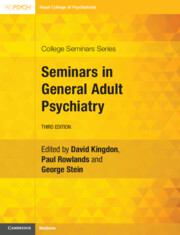Book contents
- Seminars in General Adult Psychiatry
- College Seminars Series
- Seminars in General Adult Psychiatry
- Copyright page
- Reviews
- Contents
- Contributors
- Introduction
- Chapter 1 Clinical Epidemiology
- Chapter 2 Assessment, Formulation and Diagnosis
- Chapter 3.1 Clinical Features of Depressive Disorders
- Chapter 3.2 Causes of Depression
- Chapter 3.3 Drug and Physical Treatments of Depression
- Chapter 3.4 Psychological and Social Treatment of Depression
- Chapter 4.1 Bipolar Disorder
- Chapter 4.2 Bipolar Disorder
- Chapter 5.1 Schizophrenia and Other Primary Psychoses
- Chapter 5.2 Causes and Outcome of Psychosis
- Chapter 5.3 Drug Treatment of the Psychoses
- Chapter 5.4 Psychosocial Management of Psychosis
- Chapter 6.1 Anxiety Disorders
- Chapter 6.2 Post-traumatic Stress Disorder
- Chapter 6.3 Specific Phobias
- Chapter 6.4 Obsessive-Compulsive and Related Disorders
- Chapter 6.5 Functional Neurological Disorder
- Chapter 6.6 Bodily Distress Disorder, Chronic Pain and Factitious Disorders
- Chapter 7.1 Clinical Features and Implications of New Classification of Personality Disorders
- Chapter 7.2 Clinical Approaches to Personality Disorder (AKA Complex Emotional Needs)
- Chapter 7.3 Antisocial and Other Personality Disorders, Impulse Control Disorders, and Non-substance Addictive Disorders
- Chapter 8 Neuropsychiatric Disorders
- Chapter 9 Autism
- Chapter 10 Attention-Deficit/Hyperactivity Disorder
- Chapter 11 Sleep Disorders and Psychiatry
- Chapter 12 Eating Disorders
- Chapter 13 Perinatal Psychiatry
- Chapter 14 Substance Use Disorders
- Chapter 15 Suicide and Self Harm
- Chapter 16 Physical Health Care
- Chapter 17 Culture, Mental Health and Mental Illnesses
- Chapter 18 Psychiatry in Primary Care
- Chapter 19 Psychiatry in the General Hospital
- Chapter 20 Adult Mental Health Services
- Index
- References
Introduction
Published online by Cambridge University Press: 04 April 2024
- Seminars in General Adult Psychiatry
- College Seminars Series
- Seminars in General Adult Psychiatry
- Copyright page
- Reviews
- Contents
- Contributors
- Introduction
- Chapter 1 Clinical Epidemiology
- Chapter 2 Assessment, Formulation and Diagnosis
- Chapter 3.1 Clinical Features of Depressive Disorders
- Chapter 3.2 Causes of Depression
- Chapter 3.3 Drug and Physical Treatments of Depression
- Chapter 3.4 Psychological and Social Treatment of Depression
- Chapter 4.1 Bipolar Disorder
- Chapter 4.2 Bipolar Disorder
- Chapter 5.1 Schizophrenia and Other Primary Psychoses
- Chapter 5.2 Causes and Outcome of Psychosis
- Chapter 5.3 Drug Treatment of the Psychoses
- Chapter 5.4 Psychosocial Management of Psychosis
- Chapter 6.1 Anxiety Disorders
- Chapter 6.2 Post-traumatic Stress Disorder
- Chapter 6.3 Specific Phobias
- Chapter 6.4 Obsessive-Compulsive and Related Disorders
- Chapter 6.5 Functional Neurological Disorder
- Chapter 6.6 Bodily Distress Disorder, Chronic Pain and Factitious Disorders
- Chapter 7.1 Clinical Features and Implications of New Classification of Personality Disorders
- Chapter 7.2 Clinical Approaches to Personality Disorder (AKA Complex Emotional Needs)
- Chapter 7.3 Antisocial and Other Personality Disorders, Impulse Control Disorders, and Non-substance Addictive Disorders
- Chapter 8 Neuropsychiatric Disorders
- Chapter 9 Autism
- Chapter 10 Attention-Deficit/Hyperactivity Disorder
- Chapter 11 Sleep Disorders and Psychiatry
- Chapter 12 Eating Disorders
- Chapter 13 Perinatal Psychiatry
- Chapter 14 Substance Use Disorders
- Chapter 15 Suicide and Self Harm
- Chapter 16 Physical Health Care
- Chapter 17 Culture, Mental Health and Mental Illnesses
- Chapter 18 Psychiatry in Primary Care
- Chapter 19 Psychiatry in the General Hospital
- Chapter 20 Adult Mental Health Services
- Index
- References
Summary
Psychiatry, according to Johann Christian Reil (1759–1813), the German anatomist who first coined the term, consists of the meeting of two minds, the mind of the patient with the mind of the doctor. As the patient’s story unfolds, the doctor’s task is to recognise the pattern and to do so with compassion. Pattern recognition lies at the heart of the diagnostic process throughout medicine and none more so than in psychiatry, which lacks almost all the special investigations that help clarify diagnosis in other medical specialities. Thus, detailed knowledge of the key features of all the psychiatric disorders, both common and rare, is the core body of information that the psychiatrist will need to acquire during their training years. Because of this, we have provided detailed descriptions of each and every disorder as well as their diagnostic criteria according to DSM-5 and ICD-11.
- Type
- Chapter
- Information
- Seminars in General Adult Psychiatry , pp. 1 - 5Publisher: Cambridge University PressPrint publication year: 2024

